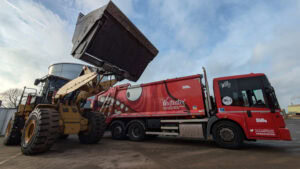What are the key priorities or themes you foresee in the waste management industry in 2025?
After some welcome momentum in 2024, the year ahead will be again dominated by the implementation of the government’s Resources and Waste strategy and the development of new policies to finally kickstart growth in recycling levels.
In 2025, the top priority for the waste management industry must be the successful rollout of Simpler Recycling, helping our customers drive behaviour change without creating additional, unnecessary costs or challenges. Simultaneously, managing the changes to extended producer responsibility (EPR) will be critical to ensure a seamless transition for local authorities and businesses. With a full year’s worth of data for packaging EPR and information on the base fees, producers will be able to start to adjust their packaging strategies for recyclability whilst controlling costs.
Looking ahead we need a greater focus on stabilising and then developing the market for recycled plastic materials, both in the UK and Europe, which will contribute to the UK’s economic growth and help drive belief and investment in the circular economy. It needs to be harder to export unprocessed plastic but easier to export the recycled material to compete in an international market.
A number of policy interventions are urgently required. We must:
- End or severely restrict plastic waste export, to prevent the loss of vital sustainable raw materials and the risks of it being treated in countries with lower environmental standards
- Require third party verification on imported recycled plastics to make sure it is what it says it is
- Reform the packaging export recovery notes (PERN) system to re-establish a level playing field between domestic and overseas reprocessors
- Unblock delays in the Food Standards Authority’s (FSA) approval of food grade plastic so that our sector can sell UK recycled plastic in Europe
- Make the Plastic Packaging Tax progressive so that it drives increased use of recycled content over time.
Alongside these policies, EPR will hopefully help address the persistent challenge of hard-to-recycle waste. By encouraging simpler product and packaging design together with greater standardisation, we should see a reduction in the variety of niche items challenging the recycling process and greater progress towards a circular economy, avoiding the use of virgin material by extending product lifespans and value for as long as possible.
In addition to the focus on plastics, it is important we make the right decisions on how to implement the Emissions Trading Scheme (ETS). We have advocated for years that ETS should be extended to Energy from Waste (EfW) plants to incentivise the decarbonisation of the sector and move more waste up the hierarchy. There is still a lot of detail to work through to ensure that it is implemented in a way that incentivises waste producers to prevent or recycle more of their waste. A system that fails to alter how we think about waste would be a missed opportunity to create a circular economy.
Lastly, there will be a huge amount of attention on what the newly established Circular Economy Taskforce recommends, especially around plastics, food, the built environment, and transport. This is a big task and will need further input from the waste management sector to ensure any proposals are grounded in practical reality and address what needs to be done to drive the circular economy at scale. Equally, it is important that there is no loss of momentum and that intent moves into action as soon as possible. Previous delays have created uncertainty across industry and slowed down investment in the change required to deliver reforms and meet sustainability goals.
How do you see the implementation of Simpler Recycling impacting Biffa and businesses?
Simpler Recycling, if successfully implemented, will create a more consistent approach to the collection of recyclable materials and food waste across businesses and households in England. Executed well, the reforms should encourage behavioural change in the workplace, reducing contamination and reigniting stalled recycling rates.
At Biffa we are optimistic that the introduction of Simpler Recycling in England will increase the volume of business waste we collect for recycling and improve the quality of recycling feedstock material. For businesses (and local authorities from 2026), it will deliver an England-wide standardisation of materials for collection in recycling streams which will improve recycling rates and reduce carbon emissions.
The introduction of mandatory separate food waste collection will also decrease contamination of recyclables and ensure food waste can generate energy via anaerobic digestion and act as a much-needed soil improver. We’ve seen the impact such legislation can have through the initial implementation of Wales Workplace Recycling reforms, with year-on-year data from Biffa customers in Wales showing that together we are already collecting over 67% more food waste than before the regulations.
Is there any other legislation you would like to see being considered in 2025?
Decarbonisation of waste collection fleets is still a focus, with many organisations continuing their work to convert to electric vehicles (EVs). However, the EV infrastructure is years away from being able to support wide scale change in Heavy Good Vehicles (HGVs). Practically, the easiest, most cost-effective, and fastest way to decarbonise HGVs is to use alternative fuels such as HVO as an interim solution whilst the infrastructure for HGV matures. There is still a cost to this though so we would like to see more legislation that better incentivises businesses and organisations to support the transition to greener waste collection fleets.
Separately, a crackdown on waste crime is long overdue. More needs to be done by the relevant authorities to pursue organisations who are flouting compliance and cutting corners. Penalising poor behaviour will help eliminate bad practice and failing standards, while ensuring that regulation being put in place to drive sustainable change does have the desired effect. Currently over 40% of businesses within the waste industry believe they have been affected by waste crime and 18% of all waste is perceived as being illegally managed.
Can you share more about Biffa’s recent acquisitions, such as Keenan Recycling, and how they fit into your overall strategy?
We have a long-standing ambition to build the largest, most efficient, most flexible and lowest carbon commercial waste collection platform in the UK. This platform will help businesses to reduce waste, enabling the circular economy while supporting the UK’s transition to net zero.
Acquisitions remain a key part of this strategy and I was delighted that we completed the acquisition of Keenan Recycling in November 2024 – a commercial food waste collections provider operating across England, Scotland and Wales. The acquisition builds scale in our food waste collection services ahead of the implementation of the forthcoming Simpler Recycling legislation.
In 2024, we also announced the acquisitions of L&S Waste Management, Hazrem Environmental Ltd and Renewi’s UK municipal business, which have respectively further enhanced our capabilities in the management of construction, hazardous and household waste.
How is Biffa integrating artificial intelligence (AI) into its operations, and what impact do you foresee AI having on the waste management industry in 2025?
As AI continues to exponentially grow and improve, we recognise it has the potential to play an important role in sustainable waste management, notably in efficient management of data and analytics.
The importance of data underpins Biffa’s approach to sustainability: leveraging data intelligence to drive decision-making, ensure regulatory compliance and promoting the design of packaging that supports the circular economy. Through detailed data reporting and analysis, there is a huge opportunity to better inform future sustainability strategies and drive positive change across the supply chain, highlighting the intertwined relationship between data management and environmental stewardship.
Within our own operations, we are exploring the installation of robots to use AI to leverage data to improve sortation and material recovery in our recycling facilities. Starting this month, we will begin a trial to explore the use of AI in improving composition analysis and contamination detection, helping us to better understand material streams and ultimately increase recycling rates.
The health, safety and wellbeing of our employees, customers and the public is a key priority across our operations, and we are exploring ways to use AI to support this. For example, we are currently trialling vehicle pedestrian proximity systems on mobile plants that use AI to identify humans that are within five metres of a vehicle, letting the pedestrian know there is a vehicle nearby and alerting the driver to take immediate action.
Working towards our target to increase collection route efficiency by 20%, we are starting a pilot to improve our route planning and optimisation across our municipal business, leveraging AI to create more efficient, data-driven routing.
What are Biffa’s main sustainability priorities for 2025?
It is now almost five years since Biffa launched its first sustainability strategy, covering the period 2020-2030. It included a number of bold ambitions, most of which we are on track to meet. Since 2019 we have reduced our emissions by 37% and unlocked £1 billion of investment in infrastructure. It has been a period of rapid progress and change.
2025 will be another year of ambition on several fronts: We will continue to seek to drive up the amount of waste that can be reduced through our Company Shop surplus redistribution offering, to kick-start growth in business recycling off the back of the implementation of Simpler Recycling reforms, and to start construction of the UK’s first waste carbon capture plant Protos, in partnership with Encyclis.
As committed in our 2020 plan, now that we are at the half-way stage, we will look again at our strategy and where appropriate set some bold new ambitions for the business.
The introduction of electric refuse collection vehicles (RCVs) has been a key theme for the sector. Does Biffa have any plans to increase its electric fleet?
Transitioning away from diesel refuse vehicles by 2030 is a key ambition of our 2020 sustainability strategy, and while we’re really proud of the progress we’ve made in this area, the reality is that progress will remain slow unless there is more policy intervention.
Whilst fleet decarbonisation is definitely underway, efforts to completely decarbonise are hampered by the UK’s underdeveloped EV charging infrastructure. We are currently calling on the government to provide support for capital to accelerate the rollout of charging infrastructure and support fleet transition to EVs, whilst urging government to ensure that budget-constrained local authorities have ring-fenced support to build out EV and alternative fuel infrastructure on a meaningful scale.
Are there any lessons you’ve learnt from 2024 that you’re going to take into the new year?
In 2024 we reported that Biffa had achieved strong revenue growth whilst also reducing our scope 1 and scope 2 emissions, so we know it’s possible to pursue commercial and sustainability goals and we’ll strive to deliver the same for our customers and stakeholders this year.
Last year saw some brilliant examples of collaboration with our customers, innovation partners, government, industry bodies and suppliers. Initial data from the implementation of Wales Workplace Recycling demonstrates what can be achieved when the waste industry and the government work together, alongside the supply chain. However, more is needed to sustain these efforts and ensure there are consequences for non-compliance, as well as incentives to drive behaviour (and organisational) change.
As we look to the year ahead, it’s important that we don’t lose momentum on Simpler Recycling, PPT, EPR, DRS, ETS and other initiatives. Delays result in lack of confidence and investment. If we are to achieve increased sustainability in waste management and move towards a circular economy, the government needs to create a stable and secure regulatory environment.











Subscribe for free